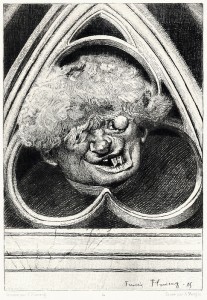Every monday for a while, I will go behind the Hunchback character’s name to see hidden facets to their characters as indicated by their names or in some cases very apparent facets. Anyway, let’s start with Mr. Quasimodo.
Quasimodo’s name is a sad pun within the book. Frollo found Quasimodo abandoned at Notre Dame on Low Sunday, the Sunday after Easter, also called Quasimodo Sunday. The name Quasimodo for this Sunday comes from the Latin text of the traditional Intriot from this day. An Introit is part of the opening of the liturgical celebration of the Eucharist. The Intriot for Low Sunday begins with “Quasi modo geniti infantes…” from 1 Peter 2:2. It roughly translates to “As newborn babes, desire the rational milk without guile…” The “Quasi modo” part means “As if” in this instance.
Quasimodo in isolation roughly means “Almost merely” or “Merely Almost.” The name indicates Quasimodo’s deformity and that he almost looks like a human or is an approximation of human. The meaning “half-formed” isn’t correct but it’s the right idea.
In the Disney version, in an effort to villainize Frollo, which considering he just kill a mother and almost committed infanticide wasn’t necessary, they claimed the name was cruel. It’s not a name that one should give to a child as the meaning isn’t all that nice but it’s not cruelly given. Naming children for days was a common practice. Frollo didn’t mean it cruelly, it was the day and apt description of the child. It is a very brilliant pun.
Side Note – Low Sunday was also known as St Thomas Sunday, so I guess Quasimodo COULD have been called Thomas but that doesn’t have the pathos as Quasimodo.
Follow thehunchblog

I always thought Frollo, while he had good intentions by adopting the child, was being rather cold by giving him that name. He took advantage of the fact that ‘Quasimodo’ coincided with a description of the foundling’s deformities. Being the scholarly man that he was, naming the child as such was not unintentional.
Still, you’re completely correct in that ‘Thomas’ would not have had the same impact or memorability.